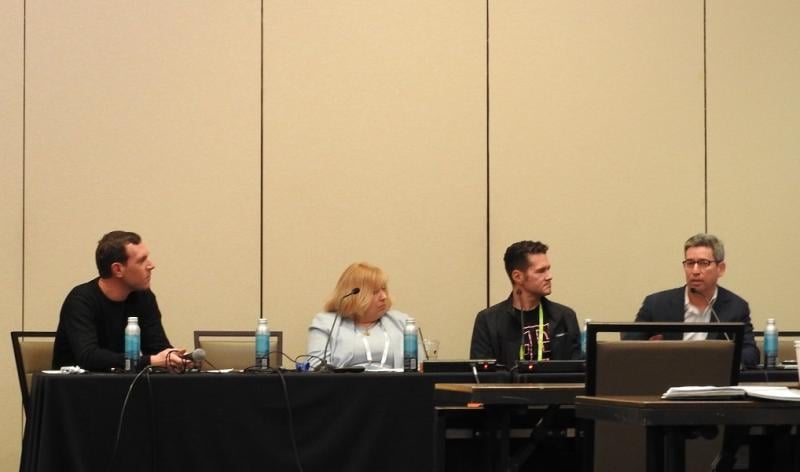-
Almost everyone wants a piece of the satellite-to-cell phone business
-
A well-attended panel at CCA’s show provided updates from T-Mobile, SpaceX and Lynk
-
Lynk says smaller carriers should band together in order to offer service from space
PALM SPRINGS, CALIFORNIA – Smaller, regional carriers were warned this week that if they don’t band together, Big Wireless and Big Satellite will eat their lunch, potentially within the next year.
Last month, the FCC adopted a regulatory framework for Supplemental Coverage from Space (SCS), giving U.S. mobile operators the go-ahead to strike deals with satellite companies to use their terrestrial spectrum for satellite-to-cell phone, aka direct-to-device (D2D), services.
The FCC’s initiative took steps to protect incumbent spectrum holders, but it requires smaller and regional carriers that don’t have contiguous nationwide coverage to seek a waiver from the FCC if they want to pursue SCS.
Margo Deckard, co-founder and COO at Lynk Global, told members of the Competitive Carriers Association (CCA) gathered here for the Mobile Carriers Show that they need to get their ducks in a row now before big wireless carriers start encroaching on their rural territory via deals with satellite players.
Lynk is focused on providing coverage in rural and remote areas. It has five commercial satellites in orbit and is inking deals with mobile operators around the world, sometimes in areas where consumers don’t have access to cell phones. However, it does not yet have a U.S. carrier partner and wouldn’t mind hooking up with a group of regional carriers if they were to organize themselves for this purpose.
Deckard suggested there’s a sense of urgency because the SCS movement is happening at a breakneck pace. T-Mobile and SpaceX are getting satellites in orbit for a messaging service they expect to launch later this year. A year from now, if all goes to plan, they’ll be up and running across the country – and the customers of smaller, regional carriers in remote areas could be more tempted than ever to jump ship for the bigger service providers.

Jeff Giard, VP, Strategic Partnerships and Business Development at T-Mobile, said he doesn’t think the situation is as dire as Lynk makes it out to be and to some degree, T-Mobile already competes with smaller carriers in rural, remote areas. Besides, he said, T-Mobile is very focused on the two other nationwide carriers, AT&T and Verizon.
New service spells opportunity
What the panelists did agree on was this: In the history of wireless, there have been few times when a shiny new service comes along that will potentially change things as dramatically as space-based coverage. An additional motivator: It can also save lives, as Apple already has shown with its SOS service offered via Globalstar.
David Goldman, VP of Satellite Policy at SpaceX, noted that there will always be places where it’s not economical to build a terrestrial network, and satellite services fill in that gap.
T-Mobile and SpaceX announced their partnership in August 2022. They’ve been testing their service, which use T-Mobile’s PCS spectrum, and they now have 12 satellites up and running. Goldman said they’re “pretty happy” with how the tests are going with the direct-to-device satellites.
The plan for T-Mobile is to start with a messaging service later this year and add data and voice services as the constellation grows more robust.
“We won’t stop,” Giard said, echoing the familiar company tag line.
They also provided some insight into how T-Mobile, once a scrappy upstart, and SpaceX are working together.
As fast as T-Mobile likes to think it moves, it can be a struggle to keep up with SpaceX. “It’s given us kind of a renewed energy to be scrappy again,” Giard said.
Turning the microphone to SpaceX: “Now I have to say nice things about T-Mobile, right? They’re great too. A little slower than we like, but you know,” Goldman remarked, sparking laughter in the audience.
On a more serious note: “It’s a great opportunity” to work on something that will change and save lives," he concluded.